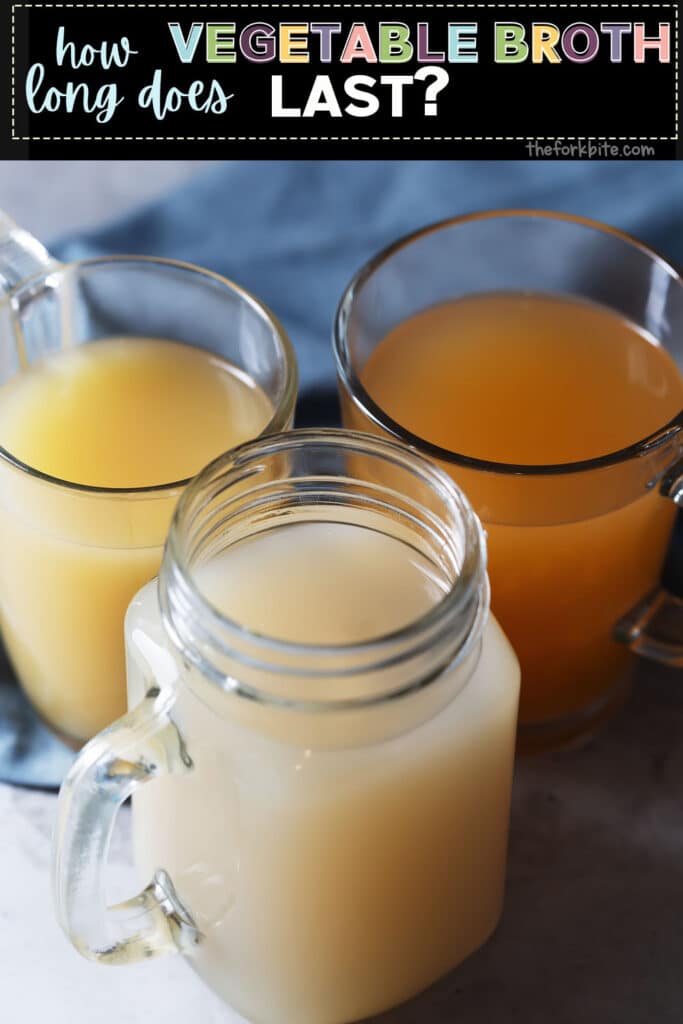Does your recipe call for a bit of vegetable broth, making you wonder what happens to the remaining broth? It is because you know that while unopened vegetable broth can last for months, it lasts only a few days in the fridge once opened.
Things aren't much different, even if you think about making your homemade veggie broth. You can keep it in the refrigerator for a few days and then freeze it as your backup option.
However, the good news is that if you need to keep the broth for more than 4 to 5 days, you can always consider freezing the leftovers.
Read on to learn more about the essentials of vegetable broth, like its shelf life, proper storage, freezing tips, and the many signs of spoilage.
Jump to:

How long does vegetable broth last?
The main factors determining how long vegetable broth lasts are:
- If it was commercially processed or store-bought
- Homemade broth
- The storage conditions
For store-bought vegetable broth
You can keep unopened, store-bought vegetable broth for as long as 1-3 months after the 'best by date.' However, it lasts this long if stored somewhere cool, dark, and dry in the pantry and away from direct sunlight and heat.
These storage conditions are essential as the longevity of unopened vegetable broth depends on how well you store them. So it's very likely that your unopened broth will go bad if kept in a warm environment.
While storing the broth at room temperature is okay, any nearby heat source reduces its shelf life and nutritional value. That is why the pantry is the best place to store your unopened cans.
Remember that the clock starts ticking once you open your can of commercially available vegetable broth. You generally have a limited time to enjoy the optimal vegetable broth flavor and quality.
Unopened store-bought vegetable broth lasts for about 4-5 days after opening. And it is when you can enjoy the broth's best quality and flavor.
Bottom line: It is better to immediately transfer the leftover broth into an airtight container or plastic zipper bag and store it in the refrigerator after opening the broth can. The broth lasts longer if kept on a fridge shelf than the door as its fluctuating temperature affects the vegetable broth quality.
For homemade vegetable stock
Your homemade vegetable broth will last 4-5 days in a properly chilled refrigerator. However, you need to let your homemade broth cool down before storing it, as it is not advisable to immediately keep hot liquids in the fridge.
It is because the container takes time to cool down, and a hot container ends up increasing the refrigerator's temperature. It, in turn, affects the other food in the fridge.
- Pouring the warm stock into a few containers helps it quickly chill down. Alternatively, you can place the entire container of broth in a bowl of ice and keep it occasionally stirring until its temperature drops.
- It is a good idea to refrigerate your stock overnight if you plan to freeze it. Refrigerating the broth leads to the fat rising to the top and hardening, letting you easily remove it.
- Freezing your homemade stock is the best way to keep it for long periods. Measuring and storing the stock separately makes it easier to use later on.
- You can use freezer bags or containers, but make sure you level them for easy usage. I generally make freezer bags holding one or two cups of broth each. This way, I can pull and use as much broth as required.
All this will take some time, but it is well worth it. Knowing homemade stock readily available in the freezer gives you a jump start for many recipes!
How long does vegetable broth last outside?
For homemade vegetable broth, do not leave it out on the counter. If left unattended at room temperature, do not keep it out for longer than two hours (this temperature range is called the "danger zone"), and harmful bacteria will start quickly growing on it after two hours.
You can store unopened vegetable broth cartons in the pantry for as long as three months. However, you can't keep it outside for more than a few hours after opening.
How long does vegetable broth last in the fridge?
It is always better to store unopened vegetable broth cans and cartons someplace cool and dry, like the pantry, and not in the refrigerator.
However, opened cans or cartons of vegetable broth need to be refrigerated after opening.
However, you need to preferably transfer the broth from the can into an airtight container or plastic zipper bag before storing it.
You can store both commercially available and homemade vegetable broth in the fridge to remain suitable for consumption for up to 5 days.
How long does vegetable broth last in the freezer?
Homemade vegetable broth lasts longer if stored in the freezer. It is, however, better to transfer the leftover broth into an airtight container and store it. And for best quality, store in the freezer for no longer than three months.
You can freeze your homemade or can of vegetable broth in the freezer and have the best quality broth for as long as six months. While the broth will be safe to eat after that, it acquires an 'off-taste.
You can store a carton of vegetable broth directly in the freezer to last up to 6 months, and the broth will be safe to eat indefinitely.
In short, opened vegetable broth has to be stored in the freezer or fridge, while unopened broth lasts long in the pantry.
How to freeze vegetable broth
Knowing how to freeze my stock properly is a birthright, ensuring I always have homemade broth ready to make comforting and restorative dishes anytime you want, without having to run to the store.
While the storing process can be tricky and time and space-consuming, it's worth taking the time to have a stash always ready in the fridge.
Storing unopened vegetable broth cartons:
- You can store unopened vegetable broth cartons in the freezer.
Storing opened vegetable broth cans or cartons:
- Transfer the vegetable broth into another container like a plastic container, freezer bag, or glass jar after opening the can or carton.
- Fill the container to only ¾ capacity because the broth needs space for expansion.
In the case of plastic containers or glass jars, you can prevent cracking or shattering by freezing without the lid. You can always add the airtight lid once the broth is frozen.
However, I have my techniques for freezing stock and other liquids like soups and sauces, which I will share with you guys below.
The right container is the key.
I always prefer using glass or BPA-free plastic to store my liquids. Your stock should be cold or at least room temperature before transferring into the container for freezing, regardless of your use.
1 Glass containers
I love and have had no problems with frozen broth in these canning jars (the curved jars are not as strong as the straight-sided, wide-mouth jars), Pyrex, and Glasslock storage containers.
However, I haven't successfully frozen my broth in cleaned-out thin yogurt or Vegenaise jars. Though they are okay to store broth in the refrigerator, they usually end up cracking if stored in the freezer.
2 Reusable plastic containers
As I avoid using BPA where possible, all my kitchen plastics are now BPA-free. And the good news is that there are quite a few BPA-free storage container options available in the market.
However, if you are looking for BPA-free plastic containers, look for 'freezer-safe' containers. Like those from Gladware, not all containers are recommended for freezer use.
Here's a helpful tip. If you need and use only a tablespoon of stock at a time, you can try freezing the stock in ice cube trays!
3 Disposable plastic containers
Did you know that the famous Ziploc brand plastic bags are BPA-free? I find it significant that major companies have joined the program, wherein you can safely freeze your broth in Ziploc bags.
While you can wash and reuse them, I don't have the patience to do that! And to be frank, I don't like throwing plastic away after a single use. That's just me, and if It wasn't for that habit of mine,
I would say that Ziploc bags are the best to store broth in freezers with limited space. It's because Ziploc bags can be stacked and frozen on top of each other. But be careful, as you risk puncturing the bags if they get banged around a lot in the freezer.
Tips for freezing homemade vegetable broth:
Here is how I freeze stocks and liquids so that the containers, including glass ones, do not crack or explode in the freezer.
Freezing in glass or BPA-free plastic containers
Step 1
You must first cool down the stock to room temperature before pouring it into the jars, which prevents the glass jar from cracking from the shock of hot liquid. It takes about half an hour to cool slightly and be safe to transfer to freezer containers.
Note:
As liquids tend to expand upon freezing, filling your containers to about ¾ full or about 2 inches from the container top provides room for liquid expansion.
So if you plan to store your broth in a quart-size container, you can pour in only about 3 to 3.5 cups of liquid.
Step 2
Pour the broth into your chosen glass container while leaving about 2-3 inches of space at the top for the liquid to expand as it freezes.
Note: I recommend using wide-mouthed, straight-sided jars as they resist tracking better when compared to jars with curved shoulders. If you use jars with curved shoulders, fill them till the stock reaches the jar shoulders (the part which gently curves inward under the lids).

Step 3
I always recommend storing your container filled with broth in the freezer without its lid, and this is very important as it lets the stock freeze solid before covering it with a lid.
If you wonder why this is necessary, well, it is because the stock tends to expand more than permitted if you secure the lid before freezing. This is the main reason for the cracking of glass or thin plastics.
Useful hint:
Ensure your mason jars don't bump against one another while arranging them in the freezer. This is because the glass can crack whenever you jostle the jars while opening the freezer door or rummaging around for something.
I don't recommend freezing the broth in containers larger than a quart. Perhaps it's because I have not been able to freeze broth in these containers successfully.
Freezing broth in ice cube tray:
It is a great idea to freeze your vegetable broth in ice cubes if you generally need only to add a pinch of flavor to your dishes, or when required, you only need a cup of broth. I, however, usually make 20-25 cups of broth to not only add flavor but also for added nutrition.
Step 1
Pour the broth into an empty ice-cube tray to let it cool before freezing it in the freezer. I generally make 4-cup portions and cubes, measuring one cup of stock into the cube trays comprising 11 cubes each.
Step 2
Alternatively, you can transfer the broth into a resealable plastic Ziploc bag or any resealable container. It helps save space and provides easy access when storing the broth for up to 2 months.
Freezing broth in resealable plastic Ziploc bags
There is no doubt that the easiest way to store broth in the freezer is by pouring and storing It in resealable plastic Ziploc bags.
Here's how you should freeze broth in Ziploc bags:
Step 1
Freeze broth In a Ziploc bag by opening it in a medium-sized pot or bowl. Next, you have to pour In the stock while remembering to fill it only three-fourths full. The benefit of using a pot is that you have both hands free to conveniently close and freeze flat the Ziploc.
Step 2
In the same way, fill out each bag to no more than ¾ full while squeezing out as much air as possible.
Step 3
Now place all the sealed bags flat on an oven baking sheet, and transfer them to the freezer.
Step 4
Once the stock is frozen, you can remove the baking sheet and stack the bags of flattened stock like books, either on the side or edge.
Defrosting frozen vegetable broth
If you are short of time, place the frozen container into a bowl or any other container of cold water. Leave it there till the stock defrosts enough to transfer from the container Into a saucepan to melt.
- DO NOT run hot water over glass containers taken directly out of the freezer.
- DO NOT submerge the frozen container in hot water, too, as it will only lead to a cracked container.
You can alternatively do what I do, which may not be FDA-approved, and though it may encourage the growth of bacteria, it is something I regularly do without any health consequences.
On the stove
If you hurry to defrost the vegetable broth, try thawing It on your stovetop. You only need ten minutes, but you should do it under close supervision lest you end up with burnt broth.
- Start with low heat whenever you defrost vegetable broth on the stove; you will see the broth melting in a few minutes.
- You can increase the heat to medium once the broth covers the pot bottom. However, do keep occasionally stirring till the broth thaws completely.
In the fridge
Did you know that transferring vegetable stock to your fridge helps thaw it? While It requires about 6 hours, I generally leave the stock in the refrigerator overnight.
I prefer thawing my broth this way because I can quickly warm the broth without much supervision. Besides, it's easy and convenient to refreeze any leftover broth.
How long is vegetable broth good for after the expiration date?
While most store-bought vegetable broth has a best-by date, remember that this is not an 'expiration date'; it is just a best-by date where the product usually can and lasts long after that date.
It's because the date isn't the broth's expiration date, but it just estimates how long you can have peak quality broth. So, you can safely use the broth even weeks after the date.
Vegetable broth generally retains quality up to three months after the expiry date. However, it can vary based on the ingredient quality, manufacturer, and packaging. So broths made using quality Ingredients last much longer after their best-by-date.
Telltale signs vegetable broth has gone bad
While many vegetable broth brands are available, and you can make your own, its flavor and color vary depending on the broth. And with so many variables involved, here's how you can tell if your vegetable broth has gone wrong.
1 Best by date:
As every vegetable broth can and carton comes with a best-by-date, you first have to check whether you can use it or not. Even homemade broth that is canned and stored should have a date to help you ascertain if it's good to use.
2 Quality of container:
Bulging or leaking unopened containers and jars with rusty lids are probably best thrown away.
3 Foul smell:
Throw away vegetable broth that smells rotten, sour, or way off.
4 Presence of mold:
Look for any signs of mold in vegetable broth stored in the fridge for some time. You have to throw it away if there are mold signs.
5 Funky taste:
If you don't see any signs of spoilt broth, give it a quick taste. It's better to throw away the broth if it doesn't taste fresh or if it tastes off.
Final thoughts
While you can easily make vegetable broth at home, it's also readily available in tetra packs and cans at the store. It offers multiple health benefits and Is the favorite food of many people worldwide.
The problem, however, is that it has a relatively short shelf life when opened, including homemade broth, which has a short shelf life unless refrigerated.
The best way to prolong the life of your broth is to buy only as much broth as needed and freeze or use up the remaining broth within a few days.




